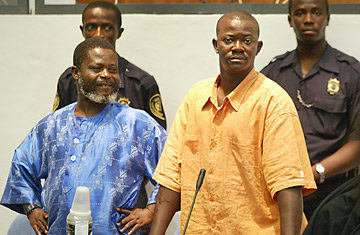
Sierre Leone rebel commanders Augustine Gbao, left, and Issa Hassan Sesay at the U.N.-backed Special Court for Sierra Leone in Freetown on June 3, 2004
(2 of 2)
Has the experiment worked?
I guess [the] proof of the pudding is that the country held an election in August and September 2007 where not only was the opposition not expected to get in, they were allowed to get in. That's pretty positive. What the court has done is reinforce the peace and restore the rule of law to allow events like that to happen. Of course, profound challenges remain. Sierra Leone is one of the world's least developed nations. Infant mortality is the worst in the world. Infrastructure is terrible. And a court can only deliver so much. Some people ask whether the money spent on the court wouldn't be better spent on development. But at the end of the day, it's restoring law and order that makes development possible.
What are the wider implications of today's judgment?
It sends the message to heads of state around the world that impunity has ended. The biggest example of that is Charles Taylor on trial in the Hague. Taylor was a chief of state and a big power in West Africa. When he was indicted in 2003, he was allowed to go into exile. That was the solution of choice in the past, for leaders like Idi Amin [the Ugandan dictator who found exile in Saudi Arabia].
But because of what had happened with the tribunals over Rwanda and Yugoslavia, that was no longer possible. The world had changed. Now we knew that we could put these people on trial and do it fairly. And all over the world, people expected the same action to be taken against their leaders. And we had to do it. You know, when we indicted Taylor, we had no idea of how we were going to get him arrested. Now, since he has been arrested — and despite an amnesty — when you are indicted, you know that day, that arrest will come. It's not a question of if, but when. The symbolism of it is immense.
There are also some specific lessons from our experience. In many of the situations where you need to bring leaders to account, [you can apply the Sierra Leonean model of] a hybridized court, where you obtain local and international support to bring people to justice and call their bluff. The International Criminal Court is often told, "You are just prosecuting cases in Africa. You are biased against Africa." The answer, I think, is a hybrid model able to deliver the kind of cooperation that an international court sitting outside the region with an exclusively U.N. staff cannot do.
I understand the court's work is in danger, however. You're running out of money.
From the beginning, the decision was taken to have the court funded by voluntary contributions. That makes it very challenging. Countries make their decisions on whether to fund it annually. There are other priorities, particularly in the current climate, and getting that funding is very difficult. Some days we have been down to our last $6,000. We have had some very hungry days. When I look at our pledges today, we can get to June or July, maybe August, but I just don't know after that, and I don't know where we will get the money. It's a real challenge. But I'm hopeful. It's the most important case in the world.
Why?
It's the trial of a chief of state. A strongman accused of committing horrific crimes, and not even in his own country, but one next door. It's being held at the crossroads of international justice, in the Hague. And we're showing that we can do it in a fair and transparent manner. That sends a signal to every chief of state in the world. This is not some guy down the pecking order. We were not able to finish with Milosevic [who died mid-trial]. This is international justice on trial. And we are working very hard to ensure that it acquits itself.
